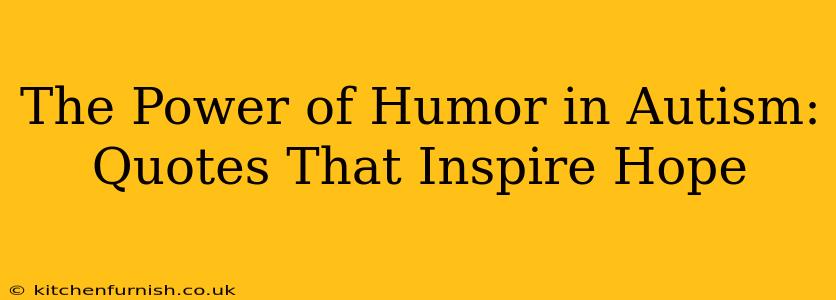The Power of Humor in Autism: Quotes That Inspire Hope
Humor. It's a universal language, a powerful tool for connection, and a surprisingly potent force in navigating the complexities of life. For individuals on the autism spectrum, humor can be a particularly potent tool, offering a unique pathway to self-expression, social connection, and even therapeutic relief. While challenges exist, the ability to find and share laughter can significantly impact the autistic experience, fostering resilience and inspiring hope. This article explores the role of humor in autism, sharing insightful quotes that illuminate its power and offering a glimpse into the vibrant, often witty, world of autistic individuals.
This isn't simply about finding funny memes or jokes; it's about understanding how humor acts as a coping mechanism, a form of communication, and a powerful force for self-acceptance. Many autistic individuals possess a remarkable wit and observational humor, often expressing themselves through clever wordplay, dry sarcasm, or unexpected observations. This unique perspective is often overlooked, overshadowed by a focus on the challenges associated with autism.
What are the benefits of humor for autistic people?
Humor offers several crucial benefits to autistic individuals. It can:
- Reduce stress and anxiety: Laughter is a natural stress reliever, and this is particularly true for those navigating the often overwhelming social and sensory demands of daily life.
- Improve social interaction: Sharing a joke or laughing together can create a sense of connection and build rapport, making social situations less daunting.
- Boost self-esteem: Finding humor in one's own experiences can foster self-acceptance and resilience, combating negative self-perception.
- Facilitate self-expression: Humor provides an alternative avenue for communication and self-expression, especially for those who struggle with verbal communication.
- Promote creative thinking: Developing and delivering humorous content requires creativity, problem-solving, and innovative thinking.
How can humor be used as a therapeutic tool for autism?
Humor therapy, though not a standalone treatment, can be a valuable adjunct to other therapies. It can:
- Create a safe and comfortable environment: A humorous approach can make therapy sessions less intimidating, allowing for greater openness and trust.
- Improve engagement and motivation: Using humor can increase engagement and make therapy more enjoyable and less burdensome.
- Process difficult emotions: Humor can provide a healthy outlet for expressing and processing difficult emotions such as anger, sadness, or frustration.
What are some examples of humorous quotes related to autism?
While attributing specific quotes solely to the autistic experience requires careful consideration, many online communities and individuals share humor that reflects their lived experience. The following are examples of the types of humor commonly found within the autistic community, representing the spirit of self-acceptance and resilience:
- Self-deprecating humor about sensory sensitivities: "My brain is like a washing machine on spin cycle, constantly reorganizing things while I'm trying to function." This example uses humor to normalize and accept a common autistic experience.
- Observational humor about social interactions: "I don't understand social cues, but I can tell you the exact weight and dimensions of every object in this room." This plays on the stereotype of autistic individuals having strengths in areas like detail-oriented observation.
- Wordplay and puns: Autistic individuals often show proficiency in wordplay, using this to create humor and connect with others.
Finding specific attributed quotes can be difficult, but the types of humor outlined above frequently appear in online forums and personal accounts shared by autistic individuals and their families.
Does humor differ between autistic and neurotypical individuals?
While the fundamental appreciation of humor remains largely consistent across neurotypes, the types of humor and the ways it is expressed can differ. Autistic individuals may find humor in different aspects of a situation, appreciating details, patterns, or logical inconsistencies that neurotypical individuals might miss. Their humor may also be more literal, less reliant on nuanced social cues, or expressed differently due to variations in communication styles.
How can parents and educators support the use of humor in autistic children?
Parents and educators can support the use of humor in autistic children by:
- Creating a safe space for expression: Encourage creativity and self-expression through drawing, writing, or acting out humorous scenarios.
- Sharing appropriate humor: Introduce age-appropriate jokes, cartoons, and humorous books that cater to their specific interests.
- Recognizing and validating their humor: Show appreciation for their unique sense of humor and perspectives.
- Using humor as a teaching tool: Make learning more engaging by incorporating humor and playfulness.
The power of humor in autism extends far beyond simple amusement. It's a vital tool for resilience, self-acceptance, and connection, offering a unique perspective on life and a valuable pathway to thriving. By embracing and celebrating the humor of autistic individuals, we not only foster their well-being but also gain a richer understanding of the diverse tapestry of human experience. The next time you encounter an autistic individual's unique sense of humor, take a moment to appreciate its power and the remarkable resilience it reflects.

